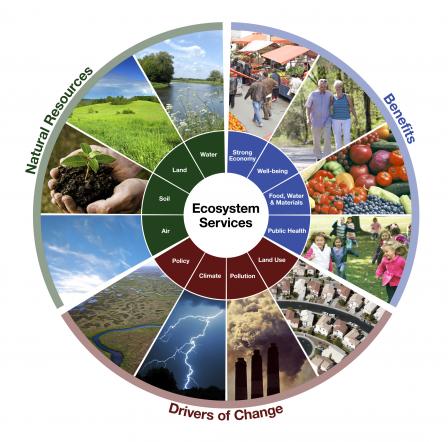Professor Pamela Soltis discusses how the Biodiversity Institute at the University of Florida promotes interdisciplinary, integrative biodiversity science
Biodiversity – the extraordinary variation of life on Earth – is fundamental to a healthy, sustainable planet, yet the connections between biodiversity, ecosystem function, and services that contribute to human well-being are less well understood. These ‘ecosystem services’ derive from healthy ecosystems and include clean air, clean water, flood resistance, protection from weather extremes, pollinators of crops, sources of foods, fibers, and medicines, recreational opportunities, and spiritual and cultural experiences, to name a few (Fig. 1).

The concept of ecosystem services traces to the 2005 United Nations Millennium Ecosystem Assessment and provides a basis for quantifying and valuing these contributions. The U.S. Environmental Protection Agency (EPA) defines ecosystem goods and services as components of nature, directly enjoyed, consumed, or used to yield human well-being. Ecological economists note the effect of invasive species (>$120 billion annually in the U.S. alone) and have begun to quantify the economic benefit of ecosystem services, but the valuation of ecosystem services is complex and includes both market and non-market values. For example, both a market (or dollar) value assigned to a specific ecosystem or component thereof and non-market values, such as societal preferences, intrinsic value, and improved public health, may contribute to the value of an ecosystem service.
Increasingly, representatives of local to national governments, as well as non-government organisations and the private sector, are incorporating the economic impact of ecosystem services into policy. Thus, sound research that integrates biodiversity and environmental science, social science, and economics is required for appropriate valuation of ecosystem services. To this end, the U.S. President’s Council of Advisers on Science and Technology (PCAST) in 2011 called for improved accounting of ecosystem services and greater protection of environmental capital, citing the need for further biodiversity science and application of informatics to enhance our understanding of ecosystem services and develop appropriate policy to protect them. More recently, the International Platform on Biodiversity and Ecosystem Services (IPBES), with 118 member nations and modeled after the Intergovernmental Panel on Climate Change (IPCC), has begun assessing the scientific and social knowledge of Earth’s biological diversity and how environmental change will impact ecosystems and human societies. Integrated, accessible science and technology platforms are needed to leverage novel planetary data, models, and tools in order to create and link knowledge to policy.
To meet the scientific and societal challenges of a changing planet, including the identification and valuation of ecosystem services, the University of Florida Biodiversity Institute promotes interdisciplinary, integrative biodiversity science in three areas: (1) global biological surveys; (2) use of Big Data; and (3) addressing major societal problems. Research on ecosystem services of Florida’s forests, grasslands, and springs is quantifying the economic value of these important resources and developing methods for valuation of ecosystem services that can be exported to other regions and resources worldwide. Working with scientists, economists, and social scientists at UF, elsewhere in the U.S., and abroad, we hope to bring greater appreciation for the many benefits that we derive from healthy ecosystems and demonstrate the significant cost – financial and otherwise – of lost biodiversity and deteriorating ecosystems.
To discover more from the Biodiversity Institute, click here.








